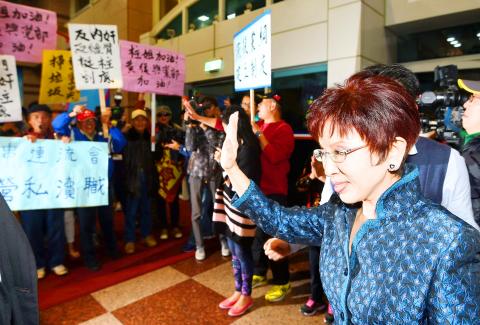Chinese Nationalist Party (KMT) Chairwoman Hung Hsiu-chu (洪秀柱) yesterday apologized to supporters for the “disturbance” that the KMT’s Central Standing Committee meeting last week has caused over a change made to the party’s chairperson election date.
In yesterday’s committee meeting, which was open to the media, there were no angry exchanges among party heavyweights and committee members as there had been in the past week, with many accusing the chairwoman of violating party regulations for her own ends.
On Wednesday last week, Hung reportedly railroaded a motion to move forward next year’s chairperson election by two months by arbitrarily interpreting the definition of a meeting quorum, when more than 20 committee members allegedly boycotted the meeting.

Photo: Fang Pin-chao, Taipei Times
The move has since sparked harsh criticism within the party, with committee member Yao Chiang-lin (姚江臨) filing a civil suit and KMT caucus convener Sufin Siluko (廖國棟) urging Hung to step down.
Hung yesterday said that as the party is facing multiple challenges, “there is no tomorrow if new breakthroughs cannot be made.”
“Solidarity and reform” is not paying lip service and only sincere communication to reach a consensus would be good for the party,” Hung said.
“There can be different views,” she said, calling on the committee members to attend the meeting to avoid misunderstandings.
A reconsideration was proposed in yesterday’s committee meeting for the motion passed on Wednesday last week, and while those who were against the motion, including Sufin and Yao, did not comment, they kept their hands down when others clapped their hands to celebrate the passage of the reconsideration.
Yao had said that he would withdraw the lawsuit if a consensus was reached yesterday, while Sufin denied that there was antagonism between he and Hung.
It was also announced in the meeting that the date for the party’s election of representatives and chairperson would remain unchanged — May 20 — but the planned merger of the party’s deep-blue Huang Fu-hsing (黃復興) military veterans’ branch with the party representative election of general local party chapters was postponed until 2021.
The total number of representatives for next year’s elections will be recalculated with more seats expected to be granted to the Huang Fu-hsing branch, KMT Secretary-General Mo Tien-hu (莫天虎) said.
Before yesterday’s meeting, there had been no dispute over the election date, sources said, adding that the debate was over merging the Huang Fu-hsing branch elections with that of general local branches, which would mean that about 90,000 members of the Huang Fu-hsing branch would no longer voting in a separate election.
The military branch has long been seen as a stronghold for “deep-blue” and “pro-China” factions, and the merger would mean a “dilution” of the votes for the party’s pro-localization faction.

CHAOS: Iranians took to the streets playing celebratory music after reports of Khamenei’s death on Saturday, while mourners also gathered in Tehran yesterday Iranian Supreme Leader Ayatollah Ali Khamenei was killed in a major attack on Iran launched by Israel and the US, throwing the future of the Islamic republic into doubt and raising the risk of regional instability. Iranian state television and the state-run IRNA news agency announced the 86-year-old’s death early yesterday. US President Donald Trump said it gave Iranians their “greatest chance” to “take back” their country. The announcements came after a joint US and Israeli aerial bombardment that targeted Iranian military and governmental sites. Trump said the “heavy and pinpoint bombing” would continue through the week or as long

TRUST: The KMT said it respected the US’ timing and considerations, and hoped it would continue to honor its commitments to helping Taiwan bolster its defenses and deterrence US President Donald Trump is delaying a multibillion-dollar arms sale to Taiwan to ensure his visit to Beijing is successful, a New York Times report said. The weapons sales package has stalled in the US Department of State, the report said, citing US officials it did not identify. The White House has told agencies not to push forward ahead of Trump’s meeting with Chinese President Xi Jinping (習近平), it said. The two last month held a phone call to discuss trade and geopolitical flashpoints ahead of the summit. Xi raised the Taiwan issue and urged the US to handle arms sales to

BIG SPENDERS: Foreign investors bought the most Taiwan equities since 2005, signaling confidence that an AI boom would continue to benefit chipmakers Taiwan Semiconductor Manufacturing Co’s (TSMC, 台積電) market capitalization swelled to US$2 trillion for the first time following a 4.25 percent rally in its American depositary receipts (ADR) overnight, putting the world’s biggest contract chipmaker sixth on the list of the world’s biggest companies by market capitalization, just behind Amazon.com Inc. The site CompaniesMarketcap.com ranked TSMC ahead of Saudi Aramco and Meta Platforms Inc. The Taiwanese company’s ADRs on Tuesday surged to US$385.75 on the New York Stock Exchange, as strong demand for artificial intelligence (AI) applications led to chip supply constraints and boost revenue growth to record-breaking levels. Each TSMC ADR represents

State-run CPC Corp, Taiwan (CPC, 台灣中油) yesterday said that it had confirmed on Saturday night with its liquefied natural gas (LNG) and crude oil suppliers that shipments are proceeding as scheduled and that domestic supplies remain unaffected. The CPC yesterday announced the gasoline and diesel prices will rise by NT$0.2 and NT$0.4 per liter, respectively, starting Monday, citing Middle East tensions and blizzards in the eastern United States. CPC also iterated it has been reducing the proportion of crude oil imports from the Middle East and diversifying its supply sources in the past few years in response to geopolitical risks, expanding